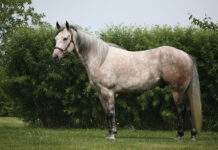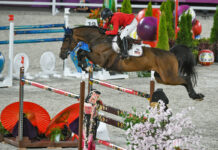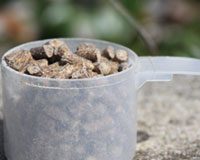Just like with people, certain diseases and conditions affect horses at different ages. As your horse ages, training your eye for common health issues that could affect him later in life can make preventative care for a senior horse a little easier. Here are some of the most common conditions affecting older horses.

1. Equine Cushing’s disease (PPID)
Caused by an over-active portion of the pituitary gland, this endocrine disease is seen primarily in horses with an average age of 20 years. One of the most common clinical signs of this condition is a long wavy coat that isn’t shed in the summer. Owners may also observe their older horse drinking and urinating excessively and losing body condition. Cushing’s horses are also predisposed to laminitis and have a weakened immune system. A few different blood tests can help your veterinarian diagnose this disease. While there is no cure, equine Cushing’s disease can be managed well with a drug called pergolide. Usually required once daily, this oral medication is prescribed by your veterinarian. Other management tools can also help keep a Cushing’s horse comfortable such as providing a low-starch, low-sugar diet.
2. Recurrent Airway Obstruction
Recurrent airway obstruction (RAO), commonly known as heaves, is a respiratory condition that is not technically specific to senior horses, but if not managed well, may have a greater impact on an older horse’s quality of life. A result of allergies to inhaled particles such as dust and mold spores, RAO can be as mild as an occasional dry cough or as severe as flared nostrils and the development of a heave line along the diaphragm. It is usually managed with a combination of steroids and environmental control. Older horses may have a weakened immune system and poorly controlled chronic inflammation from RAO can put them at risk for other respiratory diseases such as pneumonia.
3. Laminitis
Age itself isn’t a cause for increase probability of developing laminitis, but older horses can develop other diseases that put them at greater risk for this debilitating hoof disease. Senior horses with Cushing’s disease are the most likely to develop secondary laminitis and chronically obese horses and those with metabolic disease are at risk as well.
4. Dental disease
Perhaps one of the most well-known health issues of older horses is dental disease. Decades of uneven grinding and general wear and tear on continually growing teeth can make for some incredibly sharp points, uneven wear, or loose molars. Abrasions to the cheeks and tongue can make eating difficult and painful and poor teeth are a primary cause for weight loss in older horses, particularly during the winter. Regular dental care, sometimes twice yearly, can help mitigate even the worse mouths.
5. Osteoarthritis
Age and osteoarthritis (OA) seemingly go together like peanut butter and jelly in many species, horses included. The slow deterioration of joints like the hock, knee, and fetlock cause chronic lameness but this condition can frequently be easily managed. Regular exercise—even as simple as pasture turn out—can help keep stiffness at bay. Joint supplements and non-steroidal anti-inflammatories may also need to be part of a senior horse’s OA management scheme.

6. Eye issues
Not surprisingly, age-related changes can affect a horse’s eyes but fortunately, this rarely develops into full blindness. Frequently, older horses have some degree of development of senile cataracts but these are usually only small areas of lens opacity as opposed to complete cloudiness of the lens. Changes in the retina are also common in horse eyes as they age. Pigmentation changes, for example, are fairly benign at the back of the eye, but may affect the horse’s ability to see well in low light. Eye exams may not be part of your vet’s usual physical examination, so if you have a concern, ask for this evaluation specifically.
7. Cancer
No list of age-related health issues would be complete without the Big C. The biggest concern in older horses is lymphosarcoma, or cancer of the lymph tissues. Although not common, this type of cancer is particularly nasty due to its insidious growth; often owners and vets are unaware of its presence until internal damage is advanced. Melanoma is another cancer seen in older horses, normally underneath the tail or around the eyes of grays or breeds with light pigment in those areas.
Caring for a senior horse can require some extra attention but this doesn’t have to be a daunting task. Understanding common health issues in our older horses goes a long way in providing them our best care.
Anna O’Brien, DVM, is a large-animal ambulatory veterinarian in central Maryland. Her practice tackles anything equine in nature, from Miniature Horses to zebras at the local zoo.
Also Read: Back Issues







Good information, I have a older girl too.
Thanks for all the good information.